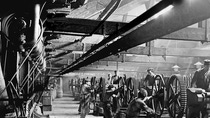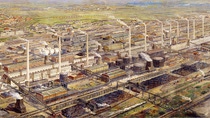Média
Looking back into the future

A company’s identity is essentially determined by its recollected history.
Mindfulness of the past is a valuable asset for any business organization. Knowing where a business comes from and the highs and lows it has been through inspires new visions, goals and solutions. It also plays a major role in attracting and retaining employees. “Company history is a really good way to understand the corporate culture of a firm and how it got that culture,” says Geoffrey Jones, Ph.D., Professor of Business History at Harvard Business School in Boston. The associated “notional, unquantifiable value added,” as Dr. Andrea H. Schneider, head of the 1976 founded, Frankfurt am Main-based Business History Society (Gesellschaft für Unternehmensgeschichte, GUG) points out, may even be relevant in mergers and acquisitions: “Corporate history is an indicator of company values. Neglecting them in the context of a merger may be one reason why it may fail,” Schneider says.
Recollected history can do a lot more: “If we look beyond the form first of all, company histories have the potential to enhance and improve the reputation of a firm with all the stakeholders, customers and suppliers,” Professor Jones says, adding: “In that sense, I see company history as almost a part of corporate social responsibility – it is the firm recognizing it is a very powerful force on its region of the world and taking it seriously.”
The latter aspect in particular calls for an authentic portrayal of company history that is not reduced to success stories alone. “We make a point of communicating the difficult patches of company history in a transparent manner, and that includes responding to queries from historians and the media,” says Úlia de Domènech, head of Corporate History at BASF. Examples of such aspects would be the company’s role in the First World War and its involvement with the Nazi regime as part of I.G. Farben, the name given to the amalgamation of Agfa, BASF, Bayer, Hoechst and a number of smaller German chemical companies in 1925. These topics are presented in detail in “BASF – A Corporate History”, a chronology written by leading historians and published in 2002. The book is also an example illustrating the increasing predominance of academic issues in business historiography. “It is an important element in helping to understand modern history,” Schneider affirms. One current hot topic of research is the historical analysis of networks, for example.
“Company history is a really good way to understand the corporate culture of a firm and how it got that culture.”
Geoffrey Jones, Ph.D., Professor of Business History at Harvard Business School in Boston
Úlia de Domènech and her team of historians are the custodians of printed matter filling almost 3,000 meters of shelf space, as well as 30,000 historical photographs and a collection of historical exhibits stored and studied in the company archives. “It is the company’s memory,” de Domènech says, “a real treasure trove of knowledge and inspiration.” Documents such as the reports of the first company doctor in the German chemical industry, who was hired in 1866, are a good illustration of how the documents not only tell the history of the company but, much more than that, are part of collective remembrance and cultural memory – which is why they are registered as part of the national cultural heritage. Knowledge from the past plays an important role in day to day business, too. The process of identifying potential soil contamination or its absence, for instance, would not be possible without historical information. Documents from former times also help present hard evidence in the event of patent queries.
Collective retrospection cannot deliver a blueprint for decisions facing us today. Nonetheless, Professor Jones considers it an important management tool – especially in these days of multicultural teams and the increasing speed of change in the echelons of top management in organizations. He says the beloved dictum, “this time it’s different” fails to acknowledge that, though circumstances may change, certain patterns tend to repeat themselves. “A knowledge of historical facts doesn’t necessarily deliver a plan of action, but it does help you to see things more clearly when analyzing a situation in the here and now,” Jones clarifies.
Sticking solely to the facts and figures is not enough in that process. Without the human factor, a company and its history remain abstract and – literally – faceless. That doesn’t just mean telling the story of some charismatic company founder or genius inventor, GUG head Schneider points out. “Contemporary corporate history looks at the employees as well as the leading figures.”

BASF has been a partner to the Chinese economy for 130 years. It began selling textile dyes, one of the most important chemical products of the time, in China in 1885. Today, BASF has a strong production base, a wide-ranging distribution network and high-performance research facilities in China. The book “Breaking New Ground” tells the fascinating story how BASF became the biggest foreign chemical investor in China. It will be published on the occasion of BASF’s anniversary in German, English and Chinese in spring 2015.

